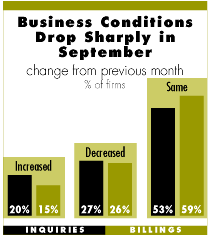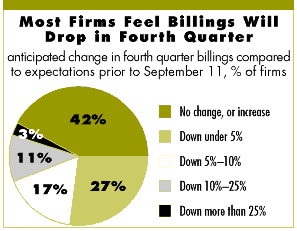
Anticipated to Remain Down in Fourth Quarter
Over half of firms report that fallout from terrorist attacks has
directly affected firm projects

by Kermit Baker, PhD
AIA Chief Economist
Business conditions had softened at many firms during the first eight months of the year. For many, however, conditions deteriorated even further in September. Over a quarter of firms indicated billings were down 5% or more in September compared to August levels, as contrasted to only 15% that reported gains. The falloff hit firms in the Northeast particularly hard; over a third of firms in that region reported a decline in billings.
 A
drop in inquiries for new work almost matched the decline in billings.
Over a quarter of firms reported a reduction in inquiries in September,
compared to only a fifth of firms that reported increases. While a slip
in billings has been fairly commonplace recently—September was the
sixth month this year that billings have fallen—this was the first
month in many years that inquires have dropped. Unless reversed, the fall
in inquiries will ensure further problems with billings at firms in the
coming months.
A
drop in inquiries for new work almost matched the decline in billings.
Over a quarter of firms reported a reduction in inquiries in September,
compared to only a fifth of firms that reported increases. While a slip
in billings has been fairly commonplace recently—September was the
sixth month this year that billings have fallen—this was the first
month in many years that inquires have dropped. Unless reversed, the fall
in inquiries will ensure further problems with billings at firms in the
coming months.
Signals still mixed
Several economic indicators point to a pronounced downturn in the economy
beginning in mid-September, although signals are still mixed. The most
obvious indication of weakness is in consumer sentiment figures. The University
of Michigan survey recorded a 10-point drop (from 91.5 to 81.8) in consumer
sentiment in September. However, the preliminary October figure showed
some improvement (it rose to 83.4), so the decline may be moderating,
or even reversing itself. A quarterly survey of business executives conducted
by the Conference Board showed a drop in business confidence for the third
quarter. However, third-quarter business confidence levels are well above
levels of late 2000 and early 2001.
The September employment figures were weak. National payrolls declined by 199,000 in September, the largest monthly decline since early 1991, which was the heart of the last recession. Of particular concern is that most of the employment information was compiled prior to September 11; the October employment report is expected to show even further job losses. However, there remain signs that certain segments of the economy still are holding up. Of particular note is that housing starts in September increased slightly to 1.57 million units at an annual rate from 1.55 million starts in August.
 Firms
expect fourth-quarter downturn
Firms
expect fourth-quarter downturn
A key question is the extent to which the fall in business activity levels
in the weeks following the terrorist attacks will be sustained. Most members
of our Work-on-The-Boards panel feel that the downturn will extend at
least through the fourth quarter. Almost 6 in 10 firms have lowered their
billings expectations for the remainder of the year, based on client reactions
since the September 11 incidents. About one firm in seven feels that the
decline in business levels will be 10% or more from their expectations
prior to September 11. On average, firms are expecting a drop in billings
of about 5% in the fourth quarter.
Participants also were asked to report recent changes in project status and business practices at their firms. More than half of firms were able to identify one or more specific impacts: 32% reported that project backlogs had declined recently; 29% indicated that previous inquiries for new projects had stalled; about a quarter indicated that planned projects had been delayed or cancelled, that active projects had been delayed, or that receivables have been growing. Again, firms in the Northeast were much more likely to report negative changes in project status than were firms in other regions.
Copyright 2001 The American Institute of Architects. All rights reserved.
![]()
|
Stand Up and Be Counted—Join the Work-on-the-Boards Survey Team Be one of the hundreds of firm principals who spend just a few minutes each month answering a fax-back survey (usually two questions). For more information on how to participate, send an email to Jennifer Schauer, call her, 202-626-7532, or send her a fax, 202-626-7527. |
|